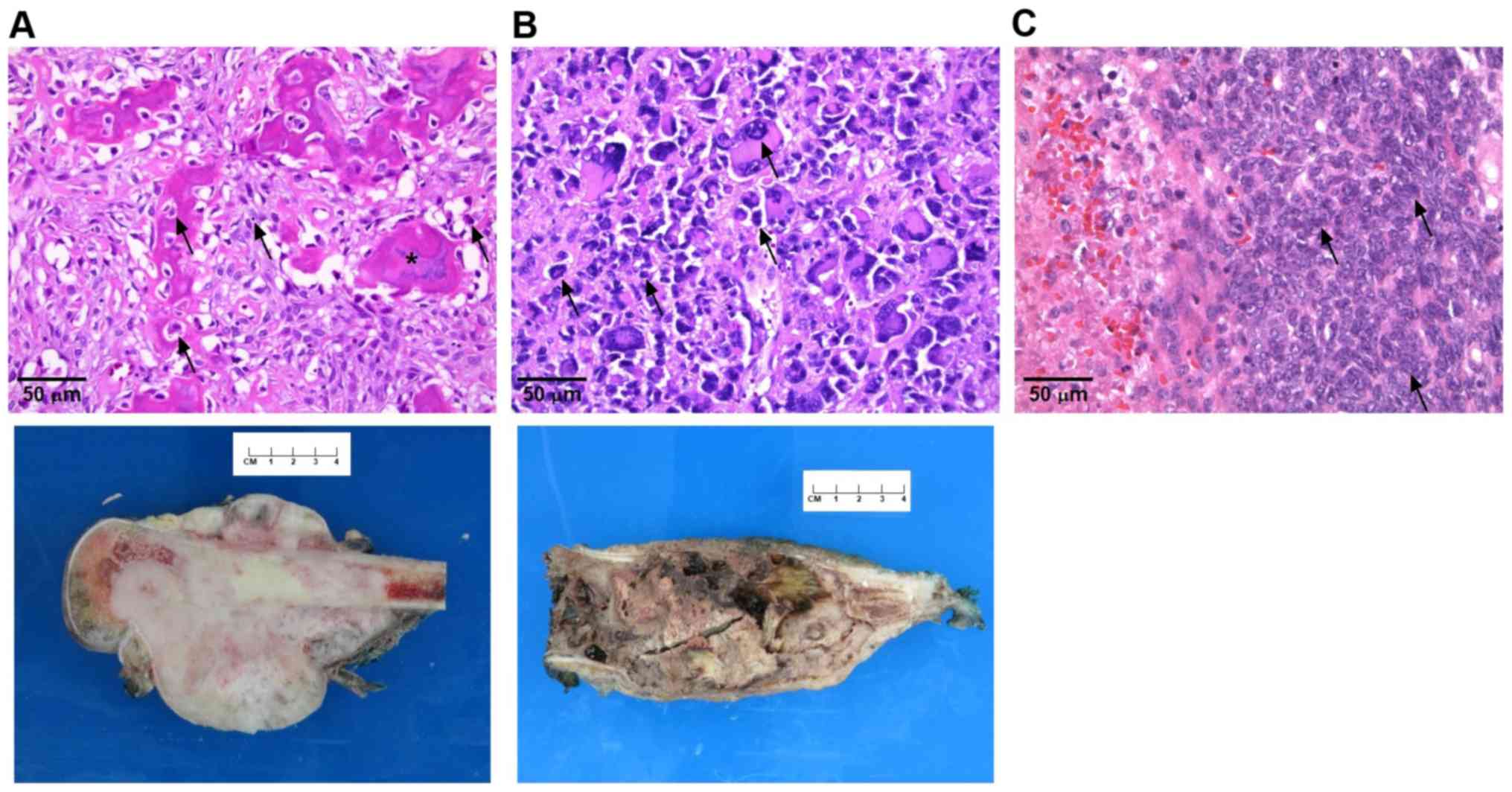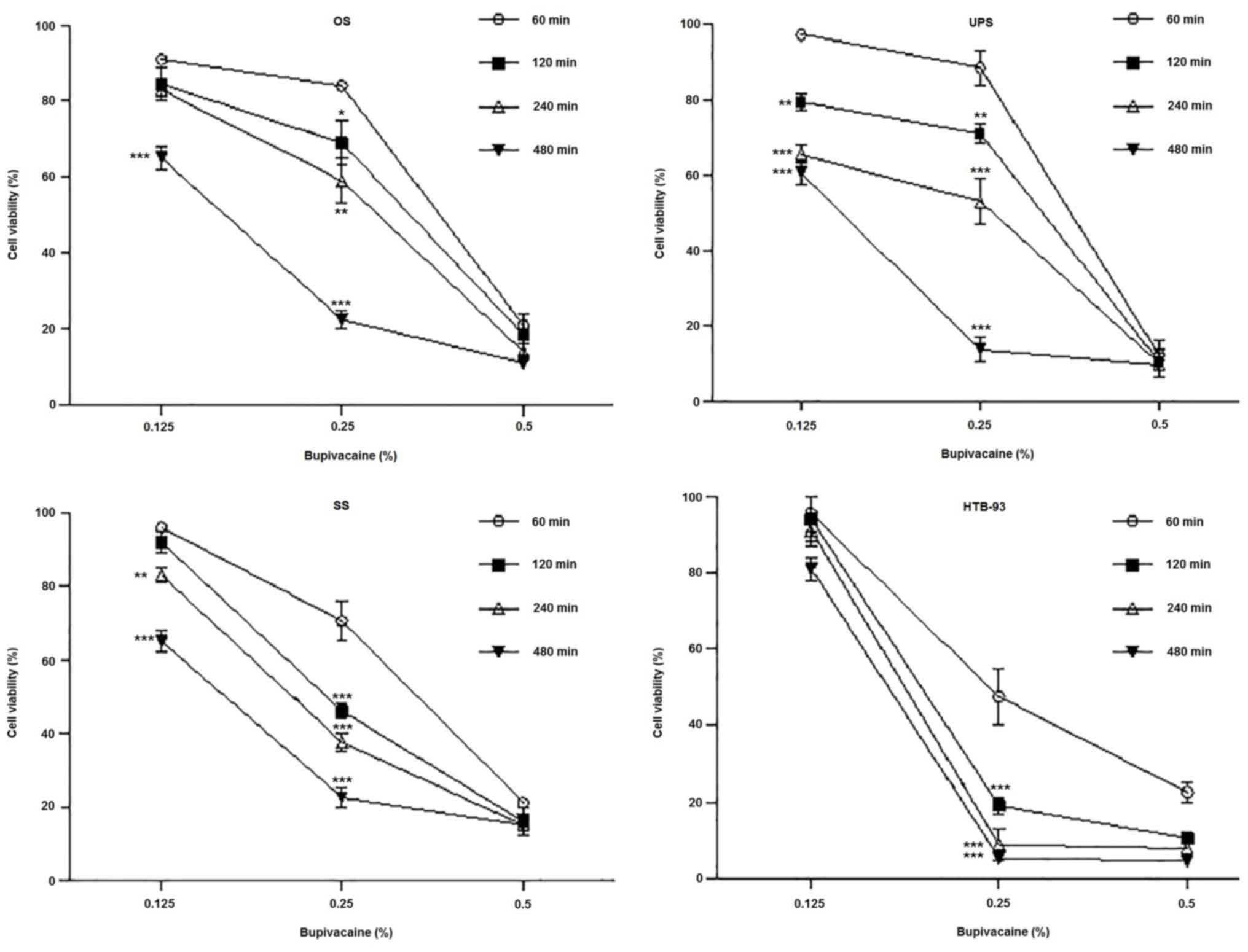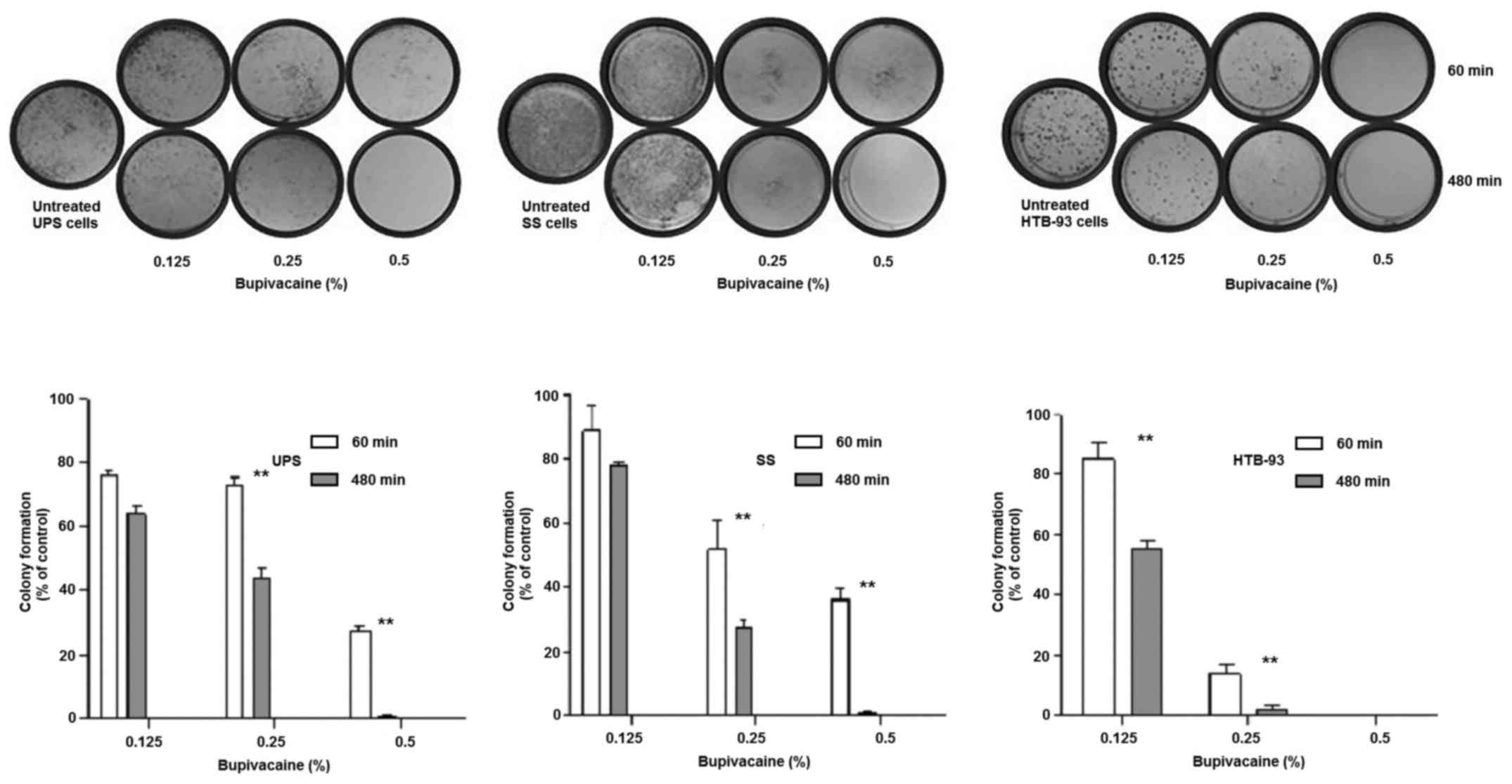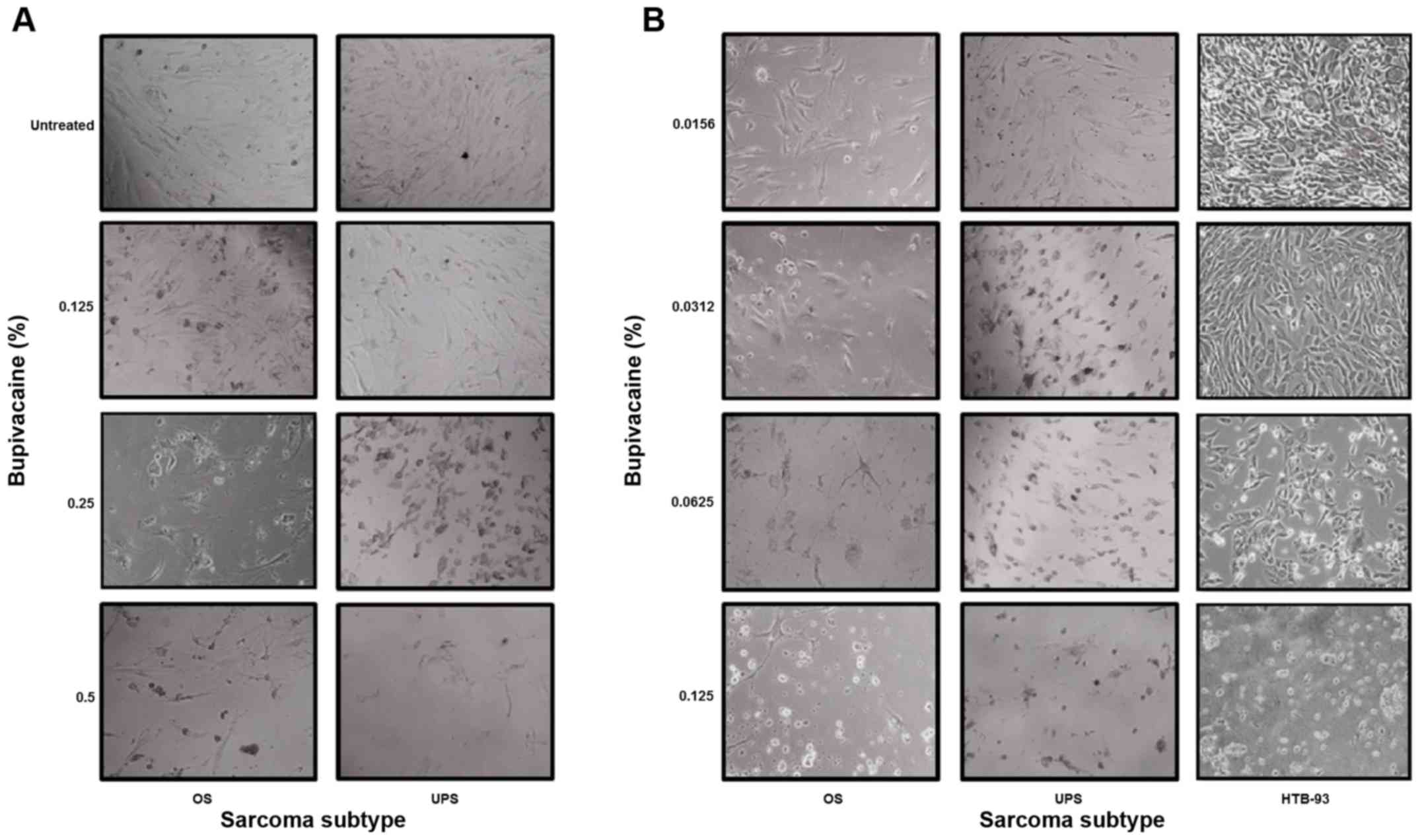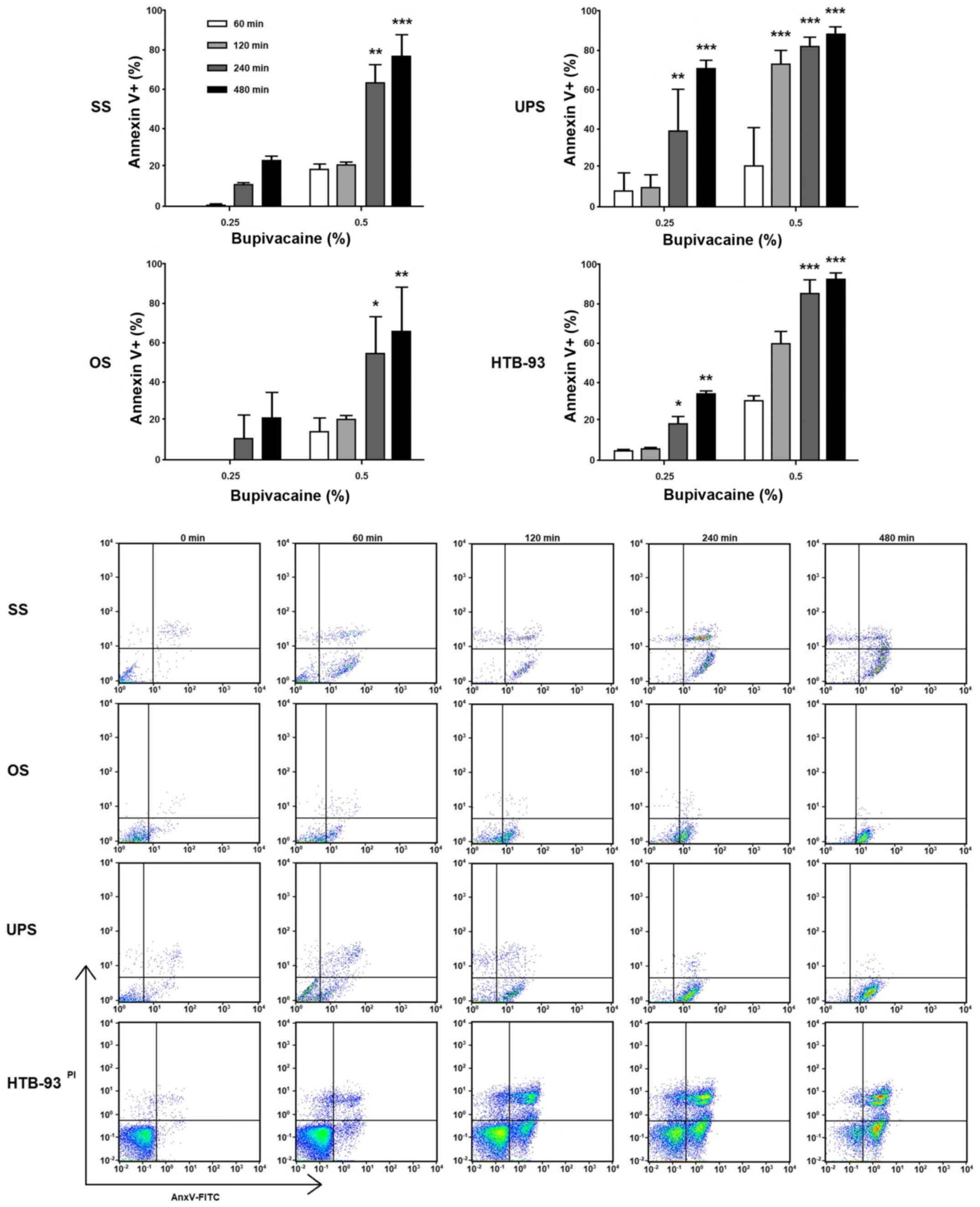|
1
|
Nystrom LM, Reimer NB, Reith JD, Dang L,
Zlotecki RA, Scarborough MT and Gibbs CP Jr: Multidisciplinary
management of soft tissue sarcoma. Sci World J.
2013(852462)2013.PubMed/NCBI View Article : Google Scholar
|
|
2
|
Arndt CA, Rose PS, Folpe AL and Laack NN:
Common musculoskeletal tumors of childhood and adolescence. Mayo
Clin Proc. 87:475–487. 2012.PubMed/NCBI View Article : Google Scholar
|
|
3
|
Bacci G, Ferrari S, Longhi A, Donati D,
Manfrini M, Giacomini S, Briccoli A, Forni C and Galletti S:
Nonmetastatic osteosarcoma of the extremity with pathologic
fracture at presentation: Local and systemic control by amputation
or limb salvage after preoperative chemotherapy. Acta Orthop Scand.
74:449–454. 2003.PubMed/NCBI View Article : Google Scholar
|
|
4
|
Pobirci DD, Bogdan F, Pobirci O, Petcu CA
and Roşca E: Study of malignant fibrous histiocytoma: Clinical,
statistic and histopatological interrelation. Rom J Morphol
Embryol. 52:385–388. 2011.PubMed/NCBI
|
|
5
|
Chen S, Fritchie K, Wei S, Ali N, Curless
K, Shen T, Brini AT, Latif F, Sumathi V, Siegal GP and Cheng L:
Diagnostic utility of IDH1/2 mutations to distinguish
dedifferentiated chondrosarcoma from undifferentiated pleomorphic
sarcoma of bone. Hum Pathol. 65:239–246. 2017.PubMed/NCBI View Article : Google Scholar
|
|
6
|
Jeon DG, Song WS, Kong CB, Kim JR and Lee
SY: MFH of bone and osteosarcoma show similar survival and
chemosensitivity. Clin Orthop Relat Res. 469:584–590.
2011.PubMed/NCBI View Article : Google Scholar
|
|
7
|
Natarajan MV, Mohanlal P and Bose JC: Limb
salvage surgery complimented by customised mega prostheses for
malignant fibrous histiocytomas of bone. J Orthop Surg (Hong Kong).
15:352–356. 2007.PubMed/NCBI View Article : Google Scholar
|
|
8
|
Sun J, Zhang RM and Zheng YX: En bloc
resection and prosthesis implantation to treat malignant fibrous
histiocytoma of the humerus. Adv Clin Exp Med. 26:781–787.
2017.PubMed/NCBI View Article : Google Scholar
|
|
9
|
Rajwanshi A, Srinivas R and Upasana G:
Malignant small round cell tumors. J Cytol. 26:1–10.
2009.PubMed/NCBI View Article : Google Scholar
|
|
10
|
Eilber FC and Dry SM: Diagnosis and
management of synovial sarcoma. J Surg Oncol. 97:314–320.
2008.PubMed/NCBI View Article : Google Scholar
|
|
11
|
Sultan I, Rodriguez-Galindo C, Saab R,
Yasir S, Casanova M and Ferrari A: Comparing children and adults
with synovial sarcoma in the surveillance, epidemiology, and end
results program, 1983 to 2005: An analysis of 1268 patients.
Cancer. 115:3537–3547. 2009.PubMed/NCBI View Article : Google Scholar
|
|
12
|
Krieg AH, Hefti F, Speth BM, Jundt G,
Guillou L, Exner UG, von Hochstetter AR, Cserhati MD, Fuchs B,
Mouhsine E, et al: Synovial sarcomas usually metastasize after
>5 years: A multicenter retrospective analysis with minimum
follow-up of 10 years for survivors. Ann Oncol. 22:458–467.
2011.PubMed/NCBI View Article : Google Scholar
|
|
13
|
Deshmukh R, Mankin HJ and Singer S:
Synovial sarcoma: The importance of size and location for survival.
Clin Orthop Relat Res. 419:155–161. 2004.PubMed/NCBI
|
|
14
|
Paice JA and Ferrell B: The management of
cancer pain. CA Cancer J Clin. 61:157–182. 2011.PubMed/NCBI View Article : Google Scholar
|
|
15
|
Borgeat A and Aguirre J: Update on local
anesthetics. Curr Opin Anaesthesiol. 23:466–471. 2010.PubMed/NCBI View Article : Google Scholar
|
|
16
|
Chang YC, Hsu YC, Liu CL, Huang SY, Hu MC
and Cheng SP: Local anesthetics induce apoptosis in human thyroid
cancer cells through the mitogen-activated protein kinase pathway.
PLoS One. 9(e89563)2014.PubMed/NCBI View Article : Google Scholar
|
|
17
|
Chang YC, Liu CL, Chen MJ, Hsu YW, Chen
SN, Lin CH, Chen CM, Yang FM and Hu MC: Local anesthetics induce
apoptosis in human breast tumor cells. Anesth Analg. 118:116–124.
2014.PubMed/NCBI View Article : Google Scholar
|
|
18
|
Chapman GL, Zuckerman LM and Mirshahidi S:
The in vitro effects of bupivacaine on cartilage-forming tumor
cells. J Am Acad Orthop Surg. 27:e337–e345. 2019.PubMed/NCBI View Article : Google Scholar
|
|
19
|
Exadaktylos AK, Buggy DJ, Moriarty DC,
Mascha E and Sessler DI: Can anesthetic technique for primary
breast cancer surgery affect recurrence or metastasis?
Anesthesiology. 105:660–664. 2006.PubMed/NCBI View Article : Google Scholar
|
|
20
|
Cummings KC, Xu F, Cummings LC and Cooper
GS: A comparison of epidural analgesia and traditional pain
management effects on survival and cancer recurrence after
colectomy: A population-based study. Anesthesiology. 116:797–806.
2012.PubMed/NCBI View Article : Google Scholar
|
|
21
|
Biki B, Mascha E, Moriarty DC, Fitzpatrick
JM, Sessler DI and Buggy DJ: Anesthetic technique for radical
prostatectomy surgery affects cancer recurrence: A retrospective
analysis. Anesthesiology. 109:180–187. 2008.PubMed/NCBI View Article : Google Scholar
|
|
22
|
Tavare AN, Perry NJ, Benzonana LL, Takata
M and Ma D: Cancer recurrence after surgery: Direct and indirect
effects of anesthetic agents. Int J Cancer. 130:1237–1250.
2012.PubMed/NCBI View Article : Google Scholar
|
|
23
|
Aamri E and Basnawi A: Effects of
anesthesia & anesthetic techniques on cellular immunity. J
Anesth Crit Care Open Access. 7(00283)2017.
|
|
24
|
Vlenterie M, Litière S, Rizzo E, Marréaud
S, Judson I, Gelderblom H, Le Cesne A, Wardelmann E, Messiou C,
Gronchi A and van der Graaf TW: Outcome of chemotherapy in advanced
synovial sarcoma patients: Review of 15 clinical trials from the
European organisation for research and treatment of cancer soft
tissue and bone sarcoma group; setting a new landmark for studies
in this entity. Eur J Cancer. 58:62–72. 2016.PubMed/NCBI View Article : Google Scholar
|
|
25
|
Elmore S: Apoptosis: A review of
programmed cell death. Toxicol Pathol. 35:495–516. 2007.PubMed/NCBI View Article : Google Scholar
|
|
26
|
Dan J, Gong X, Li D, Zhu G, Wang L and Li
F: Inhibition of gastric cancer by local anesthetic bupivacaine
through multiple mechanisms independent of sodium channel blockade.
Biomed Pharmacother. 103:823–828. 2018.PubMed/NCBI View Article : Google Scholar
|
|
27
|
Xuan W, Zhao H, Hankin J, Chen L, Yao S
and Ma D: Local anesthetic bupivacaine induced ovarian and prostate
cancer apoptotic cell death and underlying mechanisms in vitro. Sci
Rep. 6(26277)2016.PubMed/NCBI View Article : Google Scholar
|
|
28
|
Vishwanatha S and Kalappa S: Continuous
femoral nerve blockade versus epidural analgesia for postoperative
pain relief in knee surgeries: A randomized controlled study.
Anesth Essays Res. 11:599–605. 2017.PubMed/NCBI View Article : Google Scholar
|
|
29
|
Tam KW, Chen SY, Huang TW, Lin CC, Su CM,
Li CL, Ho YS, Wang WY and Wu CH: Effect of wound infiltration with
ropivacaine or bupivacaine analgesia in breast cancer surgery: A
meta-analysis of randomized controlled trials. Int J Surg.
22:79–85. 2015.PubMed/NCBI View Article : Google Scholar
|
|
30
|
Dhanapal B, Sistla SC, Badhe AS, Ali SM,
Ravichandran NT and Galidevara I: Effectiveness of continuous wound
infusion of local anesthetics after abdominal surgeries. J Surg
Res. 212:94–100. 2017.PubMed/NCBI View Article : Google Scholar
|
|
31
|
Moslemi F, Rasooli S, Baybordi A and
Golzari SE: A comparison of patient controlled epidural analgesia
with intravenous patient controlled analgesia for postoperative
pain management after major gynecologic oncologic surgeries: A
randomized controlled clinical trial. Anesth Pain Med.
5(e29540)2015.PubMed/NCBI View Article : Google Scholar
|
|
32
|
Barrientos-Ruiz I, Ortiz-Cruz EJ,
Serrano-Montilla J, Bernabeu-Taboada D and Pozo-Kreilinger JJ: Are
biopsy tracts a concern for seeding and local recurrence in
sarcomas? Clin Orthop Relat Res. 475:511–518. 2017.PubMed/NCBI View Article : Google Scholar
|
|
33
|
Tripathy S, Rath S, Agrawal S, Rao PB,
Panda A, Mishra TS and Nayak S: Opioid-Free anesthesia for breast
cancer surgery: An observational study. J Anaesthesiol Clin
Pharmacol. 34:35–40. 2018.PubMed/NCBI View Article : Google Scholar
|
|
34
|
Tripathy S, Mandal I, Rao PB, Panda A,
Mishra T and Kar M: Opioid-free anesthesia for breast cancer
surgery: A comparison of ultrasound guided paravertebral and
pectoral nerve blocks. A randomized controlled trial. J
Anaesthesiol Clin Pharmacol. 35:475–480. 2019.PubMed/NCBI View Article : Google Scholar
|
|
35
|
Shlaifer A, Sharfman ZT, Martin HD, Amar
E, Kazum E, Warschawski Y, Paret M, Brill S, Drexler M and Rath E:
Preemptive analgesia in hip arthroscopy: A randomized controlled
trial of preemptive periacetabular or intra-articular bupivacaine
in addition to postoperative intra-articular bupivacaine.
Arthroscopy. 33:118–124. 2017.PubMed/NCBI View Article : Google Scholar
|
|
36
|
Manchikanti L, Manchikanti KN, Kaye AD,
Kaye AM and Hirsch JA: Challenges and concerns of persistent opioid
use in cancer patients. Expert Rev Anticancer Ther. 18:705–718.
2018.PubMed/NCBI View Article : Google Scholar
|
|
37
|
Pinkerton R and Hardy JR: Opioid addiction
and misuse in adult and adolescent patients with cancer. Intern Med
J. 47:632–636. 2017.PubMed/NCBI View Article : Google Scholar
|
|
38
|
Paice JA: Cancer pain management and the
opioid crisis in America: How to preserve hard-earned gains in
improving the quality of cancer pain management. Cancer.
124:2491–2497. 2018.PubMed/NCBI View Article : Google Scholar
|
|
39
|
Ok SH, Hong JM, Lee SH and Sohn JT: Lipid
emulsion for treating local anesthetic systemic toxicity. Int J Med
Sci. 15:713–722. 2018.PubMed/NCBI View Article : Google Scholar
|
|
40
|
Neuwirth MG, Song Y, Sinnamon AJ, Fraker
DL, Zager JS and Karakousis GC: Isolated limb perfusion and
infusion for extremity soft tissue sarcoma: A contemporary
systematic review and meta-analysis. Ann Surg Oncol. 24:3803–3810.
2017.PubMed/NCBI View Article : Google Scholar
|
|
41
|
Bleloch JS, Ballim RD, Kimani S, Parkes J,
Panieri E, Willmer T and Prince S: Managing Sarcoma: Where have we
come from and where are we going? Ther Adv Med Oncol. 9:637–659.
2017.PubMed/NCBI View Article : Google Scholar
|
|
42
|
Lohberger B, Stuendl N, Leithner A, Rinner
B, Sauer S, Kashofer K and Liegl-Atzwanger B: Establishment of a
novel cellular model for myxofibrosarcoma heterogeneity. Sci Rep.
7(44700)2017.PubMed/NCBI View Article : Google Scholar
|
|
43
|
Gale AL, Liberman SR, Berry S, Zavlin D
and Echo A: Fluorescent imaging evaluation of lidocaine
distribution following bier block in the upper extremity. Surg
Technol Int. 31:31–34. 2017.PubMed/NCBI
|















